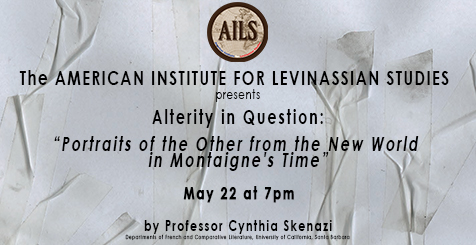
- This event has passed.
AILS – Alterity in Question: “Portraits of the Other from the New World in Montaigne’s Time”
May 22, 2018 @ 7:00 pm - 9:00 pm

About a century after Columbus landed in an island of the Americas, Montaigne reconsidered various aspects of the encounter with the Other by commenting on travel narratives reporting on such experiences. Like many contemporaries writing about the implications of these events, he had a specific political and religious agenda in mind, yet his views on alterity in the Essays provide insightful perspectives on a crucial problem of our time.
By Professor Cynthia Skenazi
Departments of French and Comparative Literature, University of California, Santa Barbara
Her publications include several books on Belgian literature in French and on Renaissance literature and culture : Marie Gevers et la nature (Académie Royale de Langue et de Littérature Françaises de Belgique, Bruxelles: Palais des Académies, 1983), Marie Gevers. Correspondance 1917-1974 (Bruxelles: Labor,1986), Maurice Scève et la pensée chrétienne (Genève : Droz, 1992), Le Poète architecte en France. Constructions d’un imaginaire monarchique (Paris: Champion-Classiques Garnier, 2003), Aging Gracefully in the Renaissance: Stories of Later Life from Petrarch to Montaigne (Boston and Leiden: Brill, 2013, Named an Outstanding Academic Title for 2014 by Choice Magazine). She was the Guest Editor of a double special issue on “Le Voyage en Europe à la Renaissance”, Romanic Review 94, 1-2, 2003, and is currently co-editing a special issue of French Forum on “Alterity in the Renaissance”.
She was the Guest Editor of a double special issue on “Le Voyage en Europe à la Renaissance”, Romanic Review 94, 1-2, 2003, and is currently preparing a special issue of French Forum on “Alterity in the Renaissance” co-edited with Colette H Winn.in a variety of universities and public institutions, including the World Bank, InterAmerican Development Bank, the White House Council of Economic Advisors, the United States Trade Representative, Stanford University, and the University of California Berkeley. Professor Hinojosa founded the North American Integration and Development (NAID) Center at UCLA in 1995, dedicated to developing innovative research agendas and policy pilot projects concerning globalization and development.
This conference will take place at the UCLA Royce Hall 306
Royce Hall is located in North Campus
PRESENTED IN ENGLISH WITH Q&A AND COCKTAIL RECEPTION
Please RSVP BY MAY 18 : [email protected]
